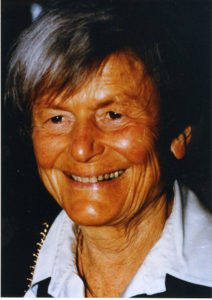
Elisabeth Mann Borgese
She trained as a concert pianist, became a professor of political science, but spent the greater part of her life working for the peaceful and sustainable use of the ocean.
Elisabeth Mann Borgese was born in Munich in 1918 as the fifth of six children. Her father was Thomas Mann, the great German writer and Nobel laureate. When she was 15, the family emigrated from Nazi Germany to Switzerland and later to the U.S. In 1972, Elisabeth founded the International Ocean Institute (IOI) as a non-governmental organization to work for the ocean. The IOI is now a global network of operational centres around the world. The IOI centres have trained hundreds of people on ocean-related issues and themes. Elisabeth organized an Annual Conference on the theme Pacem in Maribus (Peace on the Oceans) for over 25 years. She also wrote many books on the ocean, including one for children.
Elisabeth took an active part in the United Nations deliberations that were held for drafting the UN Convention on the Law of the Sea. In these negotiations, she fought hard to protect the interests of the developing countries and the small islands. She continued this campaign later at the United Nations and many other fora. Her tireless work encouraged world leaders to rethink our relationship to the sea and our management of marine resources.
Known worldwide as “The Mother of the Ocean”, Elisabeth Mann Borgese dedicated all her life to the understanding of ocean matters, to the development of a constitution for the oceans and to the consideration of the oceans as a “great laboratory for the making of a new international order based on new forms of international cooperation and organization, on a new economic theory, on a new philosophy.”
Elisabeth showed that, to help conserve the environment, one need not only hug the trees or join the protest marchers. One can work behind the scenes, patiently influencing the policy makers and working out just clauses in international agreements. She inspired many with her vision of the oceans as the Common Heritage of Humankind and by her ceaseless efforts to make this vision a reality.
Elisabeth continued her mission even in her eighties, travelling all over the world in the cause of the ocean. Like Elzeard Bouffier (The man who planted trees), she went on working until she died suddenly and quietly in February 2002.
Afterword: I had the privilege of working with her in the IOI Team from 1995 to 2001. It was her commitment and dedication that inspired me to work for conserving the environment. She was a remarkable person, always full of life and joy.
You can watch an interview with her in German here. More about the International Ocean Institute can be found on their website.

Sincerity in action is an influencing factor. It spreads energy across, as commitment and dedication is seen and felt all around. This is an example of influencing even the wrong shoulder as such persons tend to succumb to the positive vibes of the sincere individual.